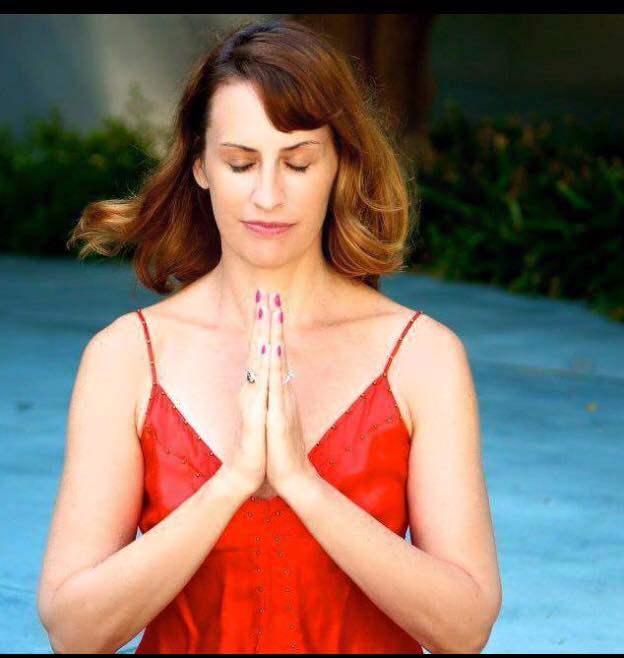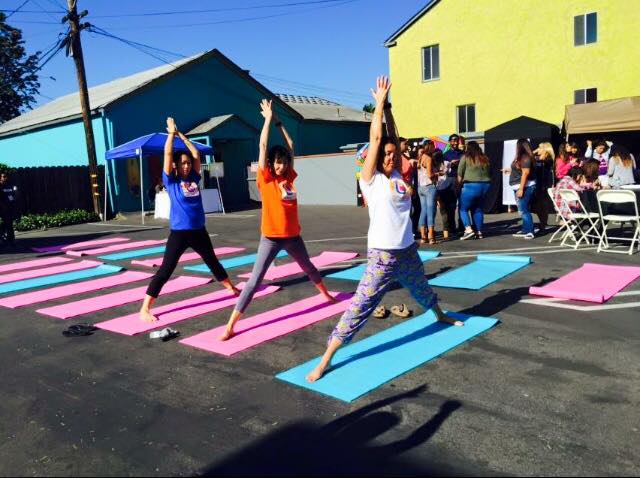Yoga For Incarcerated Youth? One Woman Says Yes

By:
Four years ago, yoga instructor Jill Ippolito started Los Angeles-based UpRising Yoga to provide free yoga sessions to incarcerated youth and underprivileged communities. Through this program, she hopes yoga can someday be viewed as a "healing modality instead of an activity."
Earlier this year, ATTN: reported on the success of Norway's Halden Prison, where it's commonplace to see staffers eating and playing games in the gym with inmates. This fosters a culture of respect that Ippolito has also created with her yoga program, which works directly with the Los Angeles County Probation Department, mental health facilities, group homes, and social work agencies. This culture of respect is hard to come by in the U.S. prison system, where more than 75 percent of released inmates are re-arrested after getting out of prison (there's little data on juvenile hall recidivism rates). As someone who was in juvenile detention herself, Ippolito understands the struggles of incarcerated youth and hopes yoga can help bring light and purpose to their lives.
ATTN: had an opportunity to ask Ippolito about serving incarcerated youth and under-served communities with yoga sessions. Here's what she told us about her program.
The interview has been lightly edited for clarity.
ATTN: What inspired you to start a yoga practice for underserved communities and incarcerated youth?
I was in the same juvenile hall as a kid when I was about 17. I was arrested, and my mom picked me up from juvenile hall. My past is pretty much jails, institutions, and addiction.
 Uprising Yoga / Facebook - facebook.com
Uprising Yoga / Facebook - facebook.com
[Later, as an adult,] I was teaching yoga in regular studios, and my husband (then my boyfriend) works in social services and policy for the county. He went to one of the [juvenile detention] camps for a visit and shuddered and said the conditions were horrible. He introduced me to somebody who gave me their card and was like, "When can you start [teaching yoga here]?" I just started volunteering every week. I didn't really know I had a program, I was just volunteering every Tuesday. I went into the girls' [area], he went into the boys' [area], and then I started asking other teachers around to join us. We ended up writing a manual and holding trainings. Years went by. It's really taken off, and that's when I found out that 82 percent of the foster youth were sexually trafficked. So we did a fundraiser with the county, and that's when my mom said she picked me up from that [exact] juvenile hall [as a teen], and I'd forgotten that. That became really appealing to me about trauma. It's in your memory, in your bones. That came full circle for me.
What do the different participants say about the yoga and how it helps them?
One of the kids thanked me after she got out. Awhile back, we had someone come in and take pictures, and she was the one who did this incredible backbend. I had pictures of her. But when she got out, she said, "I just turned 18. I've been doing yoga, and it's the only thing keeping me sane and keeping me going and grounded. Thank you so much." I ended up getting her a scholarship to become a yoga teacher. So now we are offering scholarships if people say, "How can we do this?" We can find ways through corporate sponsorships or other non-profits. We've been partnering with the community.
Last night, after one of the yoga postures, this boy got up after the posture, looked around, and said, "Wow, all of the colors are brighter and look different." The teacher asked if he was dizzy, and he said, "No, I just feel open." Doing class, it's amazing. I think they're really surprised. This kid in particular has been with us for a while. Last night, he taught one of the postures, he recites back some of the things we say.
 Uprising Yoga / Facebook - facebook.com
Uprising Yoga / Facebook - facebook.com
One kid had seven bullets in him, and he managed to stay in all the postures. I was blown away. We give certificates for their court cases, and he ... I've never seen anything like that. There's a lot of stuff that we don't know either. I was told that one of the girls had all of her toes cut off except for one because [of] her pimp. We hear horrible, horrible stories, so we started partnering with the survivors to do what we could to bring awareness first and then direct services right away. That's been a really important thing for me, not just to spread awareness, but to bring actual services to the youth and anybody that needs yoga.
Do you have any other success stories you remember or are particularly proud of?
I was teaching a bunch of social workers about how trauma informs breathing, and this woman who was very, very large showed up. She was uncomfortable in her skin. She kind of frowned and looked suspicious. I get a lot of people that have never done yoga before. She went to the back [of the room], got on her mat, took off her boots, and I just let her do what she wanted. I know [the social workers] know more than I do about trauma, so I was talking to them about it and taking them through the class. At the end, she came up to me, put her hand out, and said, "I just want to thank you and let you know I wasn't prepared to like this, obviously" before pointing to her jeans. She added, "This was the first time I really felt my heart beat, and you make me really want to seek this out."
People can be hesitant when they come in. Today, I taught in the park and I loved it. This lady who barely speaks English came out to do yoga for the first time ever. She brought her kid, who was playing with someone by the tree while she could get her time in. Every class, there's something that moves me, and today, it moved me how bad she needs that [time]. Just one hour for herself on a mat. I always reiterate, "This is your time. It's not you having to take care of anybody."
I always say the hardest part is getting there. People are coming on buses, and they're so appreciative. It's unlike any other class you would find at a regular studio.
What's your favorite part of working with these participants?
I'm always surprised at who is touched, who wants to continue. Just the look on their faces when they discover that comfort in their skin. In every class, we say, "Yoga is a gift. No one can take it from you." For me, I really want the message to go out from my heart to theirs and say, "You're safe in this. You're in the present moment, you're on your mat, all you have is your breath." It's beautiful if you can feel that in any environment. Then you really are learning peace.
Do you get a lot of participants who want to teach yoga or do it at home?
Yes. When we put the scholarship out [to teach yoga], a lot of people applied and were really upset that they didn't make it. They really want to become yoga teachers. [One of the participants who became a teacher] took it to another level. During our trauma-informed yoga trainings, she speaks to the youth. We do empowerment retreats, and [she] got up and talked about healthy eating, massages, and self-care. So she's taken her yoga to another level with her family because of diet and nutrition. She has such a passion that we call her the Spanish Martha Stewart. To get up in front of people and talk about subjects, that's part of the empowerment that we encourage.
